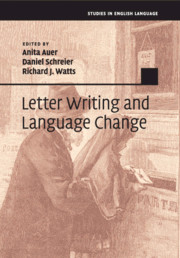18 results
Special issue on speech representation in Late Modern English text types: introduction
-
- Journal:
- English Language & Linguistics / Volume 27 / Issue 3 / September 2023
- Published online by Cambridge University Press:
- 17 October 2023, pp. 437-445
-
- Article
-
- You have access
- Open access
- HTML
- Export citation
Chapter 8 - Stylisticvariation
-
-
- Book:
- Letter Writing and Language Change
- Published online:
- 05 June 2015
- Print publication:
- 16 July 2015, pp 133-155
-
- Chapter
- Export citation
Figures
-
- Book:
- Letter Writing and Language Change
- Published online:
- 05 June 2015
- Print publication:
- 16 July 2015, pp ix-ix
-
- Chapter
- Export citation
References
-
- Book:
- Letter Writing and Language Change
- Published online:
- 05 June 2015
- Print publication:
- 16 July 2015, pp 288-318
-
- Chapter
- Export citation
Contents
-
- Book:
- Letter Writing and Language Change
- Published online:
- 05 June 2015
- Print publication:
- 16 July 2015, pp vii-viii
-
- Chapter
- Export citation
Person index
-
- Book:
- Letter Writing and Language Change
- Published online:
- 05 June 2015
- Print publication:
- 16 July 2015, pp 319-323
-
- Chapter
- Export citation
Chapter 15 - Epilogue: Where next?
-
-
- Book:
- Letter Writing and Language Change
- Published online:
- 05 June 2015
- Print publication:
- 16 July 2015, pp 277-287
-
- Chapter
- Export citation
Tables
-
- Book:
- Letter Writing and Language Change
- Published online:
- 05 June 2015
- Print publication:
- 16 July 2015, pp x-xi
-
- Chapter
- Export citation
Preface and acknowledgements
-
- Book:
- Letter Writing and Language Change
- Published online:
- 05 June 2015
- Print publication:
- 16 July 2015, pp xiii-xiv
-
- Chapter
- Export citation
Subject index
-
- Book:
- Letter Writing and Language Change
- Published online:
- 05 June 2015
- Print publication:
- 16 July 2015, pp 324-336
-
- Chapter
- Export citation
Letter Writing and Language Change - Title page
-
-
- Book:
- Letter Writing and Language Change
- Published online:
- 05 June 2015
- Print publication:
- 16 July 2015, pp v-v
-
- Chapter
- Export citation
Contributors
-
-
- Book:
- Letter Writing and Language Change
- Published online:
- 05 June 2015
- Print publication:
- 16 July 2015, pp xii-xii
-
- Chapter
- Export citation
Letter Writing and Language Change - Half title page
-
- Book:
- Letter Writing and Language Change
- Published online:
- 05 June 2015
- Print publication:
- 16 July 2015, pp i-i
-
- Chapter
- Export citation
Letter Writing and Language Change
-
- Book:
- Letter Writing and Language Change
- Published online:
- 05 June 2015
- Print publication:
- 16 July 2015, pp ii-iv
-
- Chapter
- Export citation
Copyright page
-
- Book:
- Letter Writing and Language Change
- Published online:
- 05 June 2015
- Print publication:
- 16 July 2015, pp vi-vi
-
- Chapter
- Export citation

Letter Writing and Language Change
-
- Published online:
- 05 June 2015
- Print publication:
- 16 July 2015
3 - Let’s not,let’s don’tanddon’t let’sin British and American English
- from Part I - Changes in the VP
-
-
- Book:
- Late Modern English Syntax
- Published online:
- 05 September 2014
- Print publication:
- 14 August 2014, pp 38-55
-
- Chapter
- Export citation
Contributors
-
-
- Book:
- Late Modern English Syntax
- Published online:
- 05 September 2014
- Print publication:
- 14 August 2014, pp xix-xx
-
- Chapter
- Export citation



